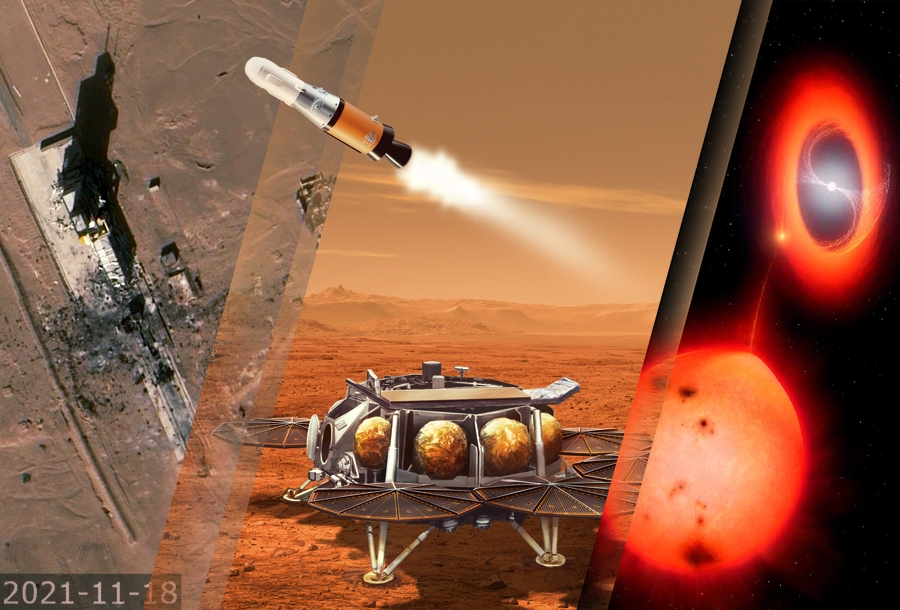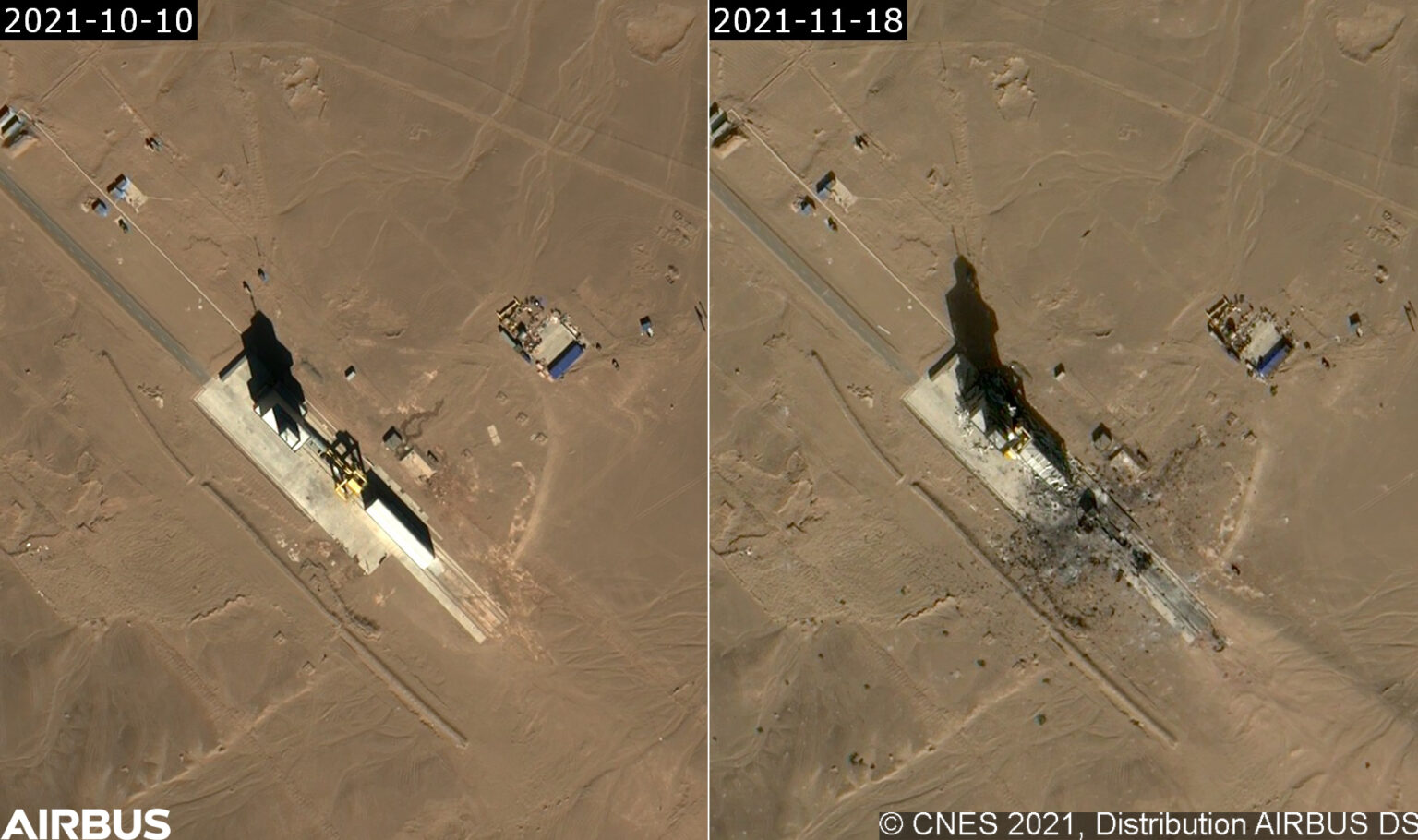Selection of the most interesting space news for breakfast: Aerospacelab will build a “megafactory” for the production of satellites, NASA and ESA are creating a special group to study samples of Martian soil samples. The consequences of a powerful explosion at the Chinese cosmodrome can be seen from space.

NASA and ESA create a new research group to return and study samples from Mars
NASA and ESA (European Space Agency), its partner in the Mars Sample Return Program, have established a new group of researchers to maximize the scientific potential of Mars rock and sediment samples that would be returned to Earth for in-depth analysis. The group, called “Mars Sample Return”, consists of 16 researchers. The campaign to return samples from the Red Planet promises to radically change humanity’s perception of it by bringing selected samples to Earth for study using the most modern instruments around the world.
From the Earth to the Moon and on to Mars – ESA and NASA take decisions and plan for the future
The next steps in exploring and using space for the benefit of European citizens were this week on the agenda at ESA’s Council meeting in ESA/ESTEC, the Netherlands on 14 and 15 June. The possibility of the first-ever European astronaut to set foot on the Moon, a telecommunication satellite for lunar exploration and a mission to return precious rock samples from Mars were all discussed.
Launch of NASA’s CAPSTONE cubesat moon mission delayed again
The launch of NASA’s CAPSTONE moon mission has been pushed back again, this time to no earlier than June 25. The team that is working on CubeSat reported the delay without specifying its cause. NASA and launch provider Rocket Lab had been eyeing yesterday (June 13) as the soonest possible liftoff date for CAPSTONE, which will send a 55-pound (25 kilograms) cubesat to the moon.
Sierra Space to start astronaut training program
Sierra Space is creating an astronaut training program led by a company executive and former NASA astronaut as another step in developing a crewed version of its Dream Chaser vehicle and a commercial space station.
The company announced June 14 it was opening a commercial human spaceflight training center and astronaut training academy at its offices at the Kennedy Space Center. Janet Kavandi, a former NASA astronaut and president of Sierra Space, will lead the center.
Market News

Starlink and OneWeb reach spectrum coordination plan
SpaceX and OneWeb said June 13 they have reached a spectrum coordination plan that would enable their current and second-generation broadband megaconstellations to coexist. In a letter to the Federal Communications Commission, the companies asked the regulator to disregard any spectrum coordination issues they had previously filed against each other.
Aerospacelab to build “megafactory” in Belgium
Belgian startup Aerospacelab announced plans to establish a “megafactory” large enough to produce 500 satellites annually.
Aerospace lab plans to operate two manufacturing plants in Belgium. The new plant will be located in Charleroi, roughly 40 kilometers from the company’s existing factory in Ottignies-Louvain-La-Neuve, which is designed to produce as many as 24 satellites per year.
Planet reveals $146 million NRO award and quarterly revenues
Planet revealed the value of its largest contract to date, a $146 million award from the National Reconnaissance Office to provide imagery over two years, during the company’s June 14 earnings call.
Rather than disclosing the maximum potential value of the contract with options over 10 years like BlackSky and Maxar Technologies, the other two companies that won contracts in NRO’s Electro-Optical Commercial Layer (EOCL), Planet reported NRO’s initial commitment of $146 million for the first two years of SkySat constellation tasking, PlanetScope daily imagery and access to Planet’s imagery archive.
Momentus increasingly pessimistic about first Vigoride mission
The first orbital transfer vehicle launched by Momentus continues to experience problems and the company says its confidence that the spacecraft can complete its mission has “substantially declined.”
The company said one issue with the spacecraft was a problem with solar arrays that failed to deploy. This caused both power and communications issues, the company said, although other body-mounted solar arrays did work correctly.
South Korean ground station operator Contec raises Series C round for global expansion
Contec said that it had raised 61 billion won ($47.3 million) in a Series C funding round to pursue its goal of building a global ground station network and operating its own Earth observation satellites.
Including 13.6 billion won raised in the two previous funding rounds, the South Korean company has raised 74.6 billion won ( or nearly $58 million) since it was founded in 2015 as a spin-off from the Korea Aerospace Research Institute. Contec is planning to go public next year, recently hiring Daeshin Securities to manage the IPO.
Interesting

Satellites photographed the consequences of the explosion at the Chinese cosmodrome
In October 2021, a powerful explosion occurred at the Chinese Jiuquan cosmodrome. This is evidenced by satellite photos showing the destroyed test stand. Jiuquan Cosmodrome is located in the Gobi Desert. It has been operating since 1958. During its existence, Jiuquan has hosted many important orbital launches, including all manned missions under the Shenzhou program.
Strange star spawned the fastest new one in the history of observations
Astronomers are buzzing after observing the fastest nova ever recorded. The unusual event drew scientists’ attention to an even more unusual star. As they study it, they may find answers to not only the nova’s many baffling traits, but to larger questions about the chemistry of our solar system, the death of stars and the evolution of the universe.
New Space Camps Set to Launch in the U.K.
Athena, the UK’s national team in space, formed by CGI, Inmarsat, Lockheed Martin UK and Serco, announced, that it will launching a series of intensive national space camps across the UK, which will offer opportunities for 120 students across 20 schools throughout the UK in a week long program.
Students will be given a full range introduction into the space science fields of astronomy, exploration, and satellite applications, to help bridge the gap from GCSE’s to A-levels, with the chance to participate in experiments, extrapolate data and have hands-on interactions with real space hardware.
Follow us on Twitter to get the most interesting space news in time
https://twitter.com/ust_magazine

